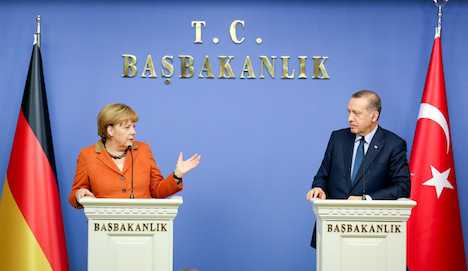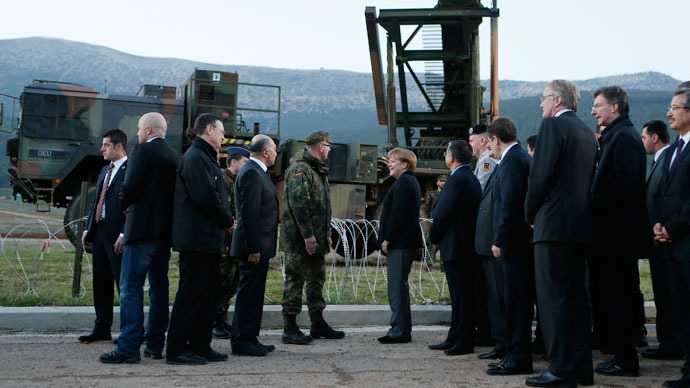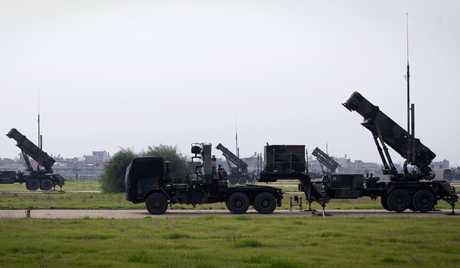ANKARA, Feb. 26 (Xinhua) — German Chancellor Angela Merkel’s two-day visit to Turkey has demonstrated that Germany is ready to accentuate its support to Turkey’s accession talks with the European Union (EU) despite lingering concerns for the eventual membership prospects.
Merkel’s cautious remarks while she was in Turkey signaled that Germany is ready to toe in the new line adopted by French President Francois Hollande, who agreed to lift the French veto on the opening of talks on one of the five chapters blocked by Paris.
“The French offering of olive branch as part of the goodwill gesture towards Turkey by Hollande seems to have forced Germany to decide to downplay its opposition to Turkey’s full membership,” Mehmet Seyfettin Erol of the Ankara-based Gazi University told Xinhua.
“It looks like both France and Germany is vying for an influence in Ankara using the EU talks as leverage,” he added.
Merkel, a conservative Christian Democrat leader, personally opposed to Turkish membership and has always advocated a watered- down link with Ankara called “privileged partnership.”
In Ankara on Monday, Merkel reiterated her skepticism, but said that “I fully support that the negotiations take place openly.”
“The change of heart in Berlin and France has to do with the economic benefits Turkey can bring to these countries that are already under heavy pressure due to lingering Eurozone woes,” Idris Gursoy, a Turkish analyst, told Xinhua.
“Germany is Turkey’s number one trading partner and as such Merkel’s visit was aimed to compartmentalize issues with Turkey with a view that political differences remain separated from economic cooperation,” he explained.
Merkel was accompanied by a delegation of German businessmen during her trip to Turkey and she attended the Turkish-German CEO Forum, jointly organized by the Turkish Industrialists and Businessmen Association (TUSIAD) and the German Industrialists Federation (BDI).
Turkey’s growing clout in the region, both economically and politically, may have given a boost to Turkish membership bid. Most EU member states support Turkish membership while the other few, led by Germany and France, are finding it increasingly difficult to make their case for the opposition to Turkey.
The 27-member bloc’s highest decision-making body, the EU Council, in December reiterated the bloc’s commitment to active accession negotiations with Turkey, while calling for a new momentum in these negotiations. This was interpreted as an indication that France and Germany increasingly find themselves isolated in the bloc in their opposition to Turkish membership.
EU Energy Commissioner Gunther Oettinger’s prediction that Germany and France would beg Turkey to join the EU within the next decade has started huge controversy in the bloc last week. Interestingly, Oettinger is a member of Merkel’s conservative Christian Democratic Union (CDU).
Turkey opened accession talks with the EU in 2005, but has only been able to finish talks on one of the 35 chapters that a candidate country has to complete before joining the bloc. No chapter has been opened for talks for the past two and a half years.
Nicole Pope, another analyst based in Istanbul, said she believes that Merkel gave tentative support to Turkey’s EU accession process and shied away from full endorsement because of upcoming German elections.
“With elections coming up later this year, the German chancellor is unlikely to be vocal in her support of Turkey’s membership bid,” she noted.
Merkel’s visits to the German military troops deployed to man two German-supplied Patriot missile batteries near the Turkey- Syria border and to the ancient churches in the region of Cappadocia were seen as efforts to score political points back at home.
Merkel said her government wanted religious foundations to operate freely in Turkey and in every country in the world.
“This is a clever move by a conservative leader to gain some backing ahead of elections,” Erol underlined.
Germany is also under pressure from Turkey on the lack of cooperation on terrorism. Ankara claims that German authorities are not doing enough to tackle fund-raising activities of the terrorist organizations that target Turkey and its citizens.
Editor: Zhu Ningzhu
via Germany revises position on Turkey’s EU bid to boost economic cooperation – Xinhua | English.news.cn.






